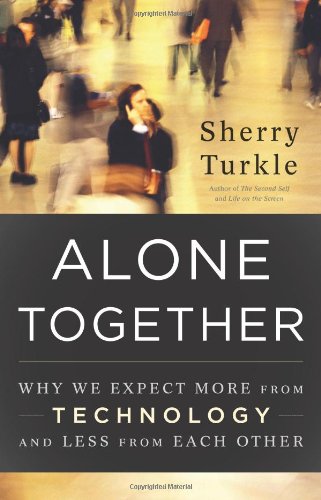Turkle, Sherry. Alone Together. New York: Basic, 2011
It would be foolish to refute the core premise of Sherry Turkle’s third installment in her series on computers and people: technology – specifically, robots and computers – have taken on agency in their relationships to humans. Her anecdotal approach threads a compelling argument through selections from her psychoanalytic research that includes over 450 subjects, of all ages. In Turkle’s estimation, computers have become what occupies us, keeping us always tethered and networked, rather than remaining our occupational instruments. Likewise, her staunch humanism views the advent of robotics that go beyond artificial intelligence by performing social functions like caring and emotion as a pivotal “robotic moment” for our lives, and for our concepts of life as such. The stakes of being-human, on her account, are changing, and not necessarily for the better. Continue reading

